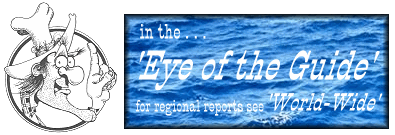Biscayne Bay
The word in the bay is "Permit," schooling Permit in really
good numbers. Large roving bands of fish in the 15 to 30 pound range
are all over the outside flats and on the inside cuts and channel edges as well. We
have seen more fish this year . . . but they are just as wary as ever.
Look for these feisty critters when there is a good tide run and all
throughout the day. Permit are not as influenced by water temperature
like Bonefish are, and will be feeding even during the midday heat.
As for what to feed them - the all time best is a live crab,
then a live shrimp. Of course I have heard stories of a couple
of old timers throwing a red and white popper at them and scoring.
Maybe it's the jack in them that would make them attack a surface bait.
My preference is a flyrod. I love to throw a crab pattern, a crab/shrimp
combination pattern and even a clouser in their favorite color of tan and
brown. Try practicing a side-arm cast, keeping your flyline as close to
the water as possible as not to spook them. The permit has huge eyes
and can see so very well, you don't need to get your bait or even fly
that close to be seen. They are used to scanning the surface for swimming
crabs in a ten foot radius around themselves, so keep the landings
of your bait a little farther away - especially when using a live crab,
they tend to sail in the wind and splash down with a plop. Keeping your
distance will give you a better shot at hooking one of these prizes.
Bonefishing over the summer months will consist of getting out of bed really early.
The water has had a chance to cool down overnight and a tide cycle has replaced
that afternoon tub water with a fresh cool batch of water. Fishing at sundown is
productive due to afternoon showers which cool off the water. I have had tailers
all around the boat on a low tide as the sun sets and the sky is on fire. It just
doesn't get any better than this. The best thing about this scenario is the fish are
eaters, up tailing away, and as happy as a clam. This makes the hookup ratio
increase and the chance for a real trophy increase as well.
There are still a number of Tarpon strolling around the outside flats.
These fish are stragglers and are not predictable as to there paths of travel.
I'm talking about the larger fish and not the adolescents that are here all
summer schooling in the cuts and channels. These fish are easy to jump
at night with mullet and even if you find a large school blasting finger mullet.
Throw a fly in there and you will be pleasantly surprised.
The Everglades
Fishing in the Everglades has been better than ever. The
Trout population is fantastic and the Red's, Snook and Tarpon have
all shown up for the picnic.
Fish the edges of the channels for trout, Snook and tarpon
during the low stages of the tides when there isn't enough water up on
the flats. As the tide returns follow the Redfish up on the crowns and
into the holes. Rays will start mudding and the large jacks will be following them
as will the reds, trout, and a few Snook. Pre-fishing the Snook to locate
the spots to fish when the season opens on September first is a lot of fun.
Just keep in mind when you find a concentration of them, don't spook them
out of that spot. Save the location for open season!
Tripletail have been all over the outside markers as have the Cobia,
look for them at slack tides around any structure, like the rock piles outside
of Ponce De Leon Bay and at the markers. Most of the guides have not
had to leave Flamingo to have a successful day of fishing. Staying in sight
of the tower at Flamingo will keep you in the zone for summer action.
See you "On the Flats!" ~ Capt. Dave Sutton
Captain Dave Sutton is a full time fishing guide in Biscayne
Bay, Florida, the upper Keys and the Everglades National Park,
an outdoor writer, and a guest fly tying instructor at Biscayne Fly
Shop, a guide for the famous Grand Slam Outfitters of
Ocean Reef. To book a trip call (305) 248-6126.
E-mail or the Website.
|

